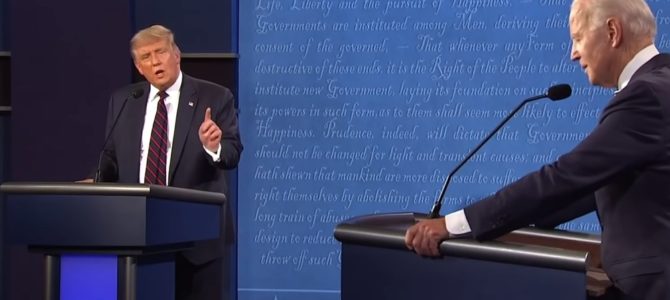Tuesday night’s presidential debate was not supposed to go down like that. Most everyone agrees that the debate, which quickly devolved into a chaotic shouting match between President Trump and former Vice President Joe Biden (with frequent, one-sided interruptions by moderator Chris Wallace), was a disaster.
But for the Commission on Presidential Debates, the body that oversees and runs these things, it was a complete failure. The debate was supposed to be an orchestrated ambush of Trump, with Wallace playing a key role helping Biden land punches and avoid getting flustered by Trump.
But it didn’t work out that way. Wallace’s obvious bias against Trump was off-putting, while Biden, despite Wallace’s help, couldn’t land any punches or fend off Trump’s attacks. (Biden’s habit, obviously coached, of looking into the camera as a way to avoid answering Trump and address the voters directly, was particularly strained and ineffective.)
All in all, the debate was probably a wash, which translates to a victory for Trump given the field was so deliberately and obviously tilted against him.
It certainly wasn’t a win, or even a draw, for Biden. You can tell because the next day, the media reacted by demanding that Biden not debate Trump again. Elected Democrats, on the other hand, know that if Biden refused to debate it would be a political disaster—their already weak nominee would look even weaker, and Trump would never shut up about it. That’s why top Democrats are calling for the debates to go on.
But since the first debate didn’t work out like it was supposed to, Democrats want the debate commission to institute some changes for the next debates, like cutting off Trump’s mic if he speaks over Biden.
The commission, which is run by a board of old liberals whose average age is over 70, was more than happy to comply. On Wednesday, it issued a statement saying it will change the rules for the next two debates.
“Last night’s debate made it clear that additional structure should be added to the format of the remaining debates to ensure a more orderly discussion of the issues,” the statement read. Although it didn’t say what changes were coming, the commission said it “intends to ensure that additional tools to maintain order are in place for the remaining debates.”
In other words, the problem Tuesday night wasn’t too much biased moderating, it was too little. The candidates were too free to simply talk as they pleased, and we can’t have that.
The irony of course is that this is the opposite conclusion one should take from Tuesday’s debate. As National Review’s David Harsanyi put it, the answer isn’t to crack down on the candidates but to let them fight it out. “As with most issues pertaining to the debates, the Commission has it backward: We don’t need more rules, we need more open-ended discussion.”
But that’s not what’s going to happen. Instead, the commission will change the rules so the media have even more power over the proceedings.
Most likely, the moderator will get a mute button or the commission will allow C-SPAN’s Steve Scully, the moderator of the Oct. 15 debate in Miami, to cut Trump’s mic whenever he pleases. Scully is no Wallace. He’s not going to argue and plead and interrupt Trump, so the commission needs to find a way to give him the ability to undercut Trump without looking transparently partisan.
Part of the calculus behind all this is to force Trump to pull out of the upcoming debates. That would avoid another effective Biden loss while preventing him from appearing weak. Short of that, the idea is to limit Trump’s ability to shape the conversation or alter the overall narrative, which, as we saw with Wallace, aligns almost perfectly with Democratic talking points.
But understand this: the setup failed the first time around, so Democrats and the commission, together with the media, are working to orchestrate a do-over. Don’t be surprised if they pull it off.









